試す 金 - 無料
The Thought of the Sangh Is Synonymous with Hindutva Thought
Outlook
|October 21, 2025
OUR work is fundamentally man-making. Swayamsevaks have entered and started working in almost all walks of our social life. They have also built various organizations and institutions. All these organizations and institutions are independent, autonomous and self-reliant. None of these organizations or institutions is run according to the decisions taken at the meetings of the Sangh. These have been started by our swayamsevaks on their own accord, and they also run them without depending on others. They keep in touch with the Sangh and also get suggestions and cooperation. The swayamsevaks also develop the sense to extend cooperation to whoever is doing some good work with honesty for the sake of society, irrespective of whether they are our supporters or opponents. Questions concerning the relationship between the Sangh and politics are being raised time and again. Is the Sangh nurturing any political ambition? The common trend nowadays is that when a person acquires capabilities and creates their own identity in the field that helped them achieve their capabilities, they will be keen on joining politics. However, the work of the Sangh is to organize the entire society. Politics, political parties and the work of organizing the society can go together only to a limited extent. Hence, the Sangh has, from the very beginning, made a strong resolve to keep itself away from politics. The Sangh will never involve itself in competitive politics, will never fight elections and the office-bearer of the Sangh will never take up any official responsibilities or positions in any political party. The Sangh will always keep itself aloof from politics.
Dr Hedgewar himself was an accomplished political worker. As a student in Kolkata, once, he had even thwarted a plan of the British government, conducting an agitation using the newspapers. The British government had planned to bring in legislation to declare invalid the degrees conferred on students of the National Colleges who had played some role in the freedom movement or agitations. It was not easy to organize an agitation against the British on this issue. Dr Hedgewar visited every nook and cranny of Kolkata, talked to prominent people, took them into confidence and convinced them to say yes, if some government officials came and enquired if any meeting was held at that place against the proposed legislation. They were also requested to respond in the affirmative, if they were asked whether they had taken part in the meeting. He also gave them the names of different people to invoke, in case they were asked to give the names of the people who had addressed the meeting. They were also supposed to inform the officials that the meeting was attended by a large number of people, and a resolution was passed unanimously, calling for the restitution of the degre
このストーリーは、Outlook の October 21, 2025 版からのものです。
Magzter GOLD を購読すると、厳選された何千ものプレミアム記事や、10,000 以上の雑誌や新聞にアクセスできます。
すでに購読者ですか? サインイン
Outlook からのその他のストーリー

Outlook
From Margins to Mainstream The Inclusive Growth Story
Haryana leads the way in welfare reforms with schemes imaginatively redesigned to support the vulnerable — women, students, workers, and the marginalised
4 mins
December 01, 2025
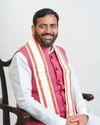
Outlook
One year of Saini Govt. marked by holistic and inclusive governance, social welfare
75 percent of promises kept and worked upon in one-fifth of tenure
4 mins
December 01, 2025
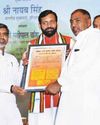
Outlook
Nurturing Urban Dreams on Rural Foundation Haryana's Housing Push Gains Pace
Haryana has redefined housing development with equity at its core. Through 'Housing for All', the state hasn't just built structures, it has rebuilt lives. From makeshift shelters to permanent homes marks a powerful journey on the road to social uplift and inclusive growth
3 mins
December 01, 2025
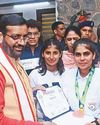
Outlook
Haryana, The Medal Factory, Powering India's Olympic Dreams
Haryana has risen as the undisputed powerhouse of Indian sports, blending grassroots talent, world-class infrastructure, and visionary policies
2 mins
December 01, 2025

Outlook
No Woman's Land
The Left parties, which champion women's representation and empowerment, fielded only one woman among their 33 candidates in the Bihar election
6 mins
December 01, 2025
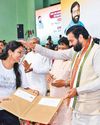
Outlook
Dignity With Jobs Youth Take the Centre Stage
Over four lakh job-seekers connected, thousands trained, and a generation empowered -- technology, transparency, and training redefine Haryana's employment landscape
2 mins
December 01, 2025
Outlook
Haryana Means Business; Here, Policy Meets Progress
Haryana is redefining industrial growth with investor-centric policies, cutting-edge digital governance, and infrastructure – making it a top destination for innovation, ease of business, and investment
3 mins
December 01, 2025

Outlook
Guarding Those Who Guard Us Haryana's Bold Vision for Soldier Welfare
With enhanced financial aid, medical grants, and priority for Agniveers in state jobs, Haryana is championing long-term opportunity and security for soldiers, ex-servicemen, and patriotic youth across the state
3 mins
December 01, 2025

Outlook
Lighting the Way with Clean Energy and People-Focussed Reforms
Haryana has transformed its power sector through a combination of rapid electrification, clean energy initiatives, and people-focussed reforms
3 mins
December 01, 2025
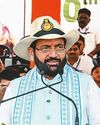
Outlook
Policing With A Human Touch Haryana's Tech-Led Transformation
From AI-enabled emergency response systems to pioneering forensic setup, from women's safety initiatives to cybercrime crackdowns, Haryana is setting new standards in technology-driven governance and public safety
3 mins
December 01, 2025
Listen
Translate
Change font size

